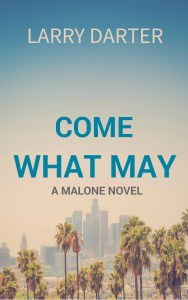Larry Darter's Blog, page 10
December 17, 2016
The Cold Hard Truth About Amazon Book Reviews
 How important are Amazon book reviews to you when deciding whether to buy a crime fiction novel?
How important are Amazon book reviews to you when deciding whether to buy a crime fiction novel?
I honestly don’t base my book buying decisions on book reviews. Here are the criteria I use.
I do judge books by their covers (an interesting cover and I’ll explore further).
The blurb (if it grabs me I continue to the inside look).
The look inside (seals the deal and convinces me to buy if it’s interesting).
I’ve often decided against buying books with lots of great reviews when the inside look contents just didn’t grab me. I’ve also bought and thoroughly enjoyed many books that had few or even poor reviews when the blurb and inside look convinced me the book was worth a try.
Every reader is different. I assume some shy away from books with few reviews or poor ratings. But I expect most readers are like me and make their own book-buying decisions without paying too much attention to the opinions of other readers. That said, Amazon reviews do remain critically important to independent authors and publishers like me for a completely different reason.
Like Google, Amazon can literally be described as a search engine, especially when it comes to books. Amazon uses algorithms just like Google does. No one outside of Amazon knows for sure how the algorithms work exactly, but it is widely accepted that ratings and reviews make a huge difference with regards to the visibility of a book on Amazon.
In other words, the more reviews a book gets, the more potential book buyers visiting Amazon that are going to see the book. A book with few reviews or no reviews might be the best book ever written, but it will remain largely invisible. Few people will buy it because few people will ever know it exists.
While I can’t personally attest to the accuracy of it, many of those who claim to be in the know say that a book must have a minimum of 10 reviews before it receives any real visibility on Amazon.
Since publication, my first crime fiction novel, Come What May, has received only one Amazon review. It is a 5-star review which I’m thrilled about, but still, I’m nine reviews short of the 10 that the experts say a book must have as a minimum. That pretty much explains why the book at the time of this writing languishes at #3146 for Police Procedurals in the Kindle Store.
In large part, it is my own fault my book doesn’t have more reviews. I’m new to fiction writing and independent publishing. I focused on the research, writing the book, editing the book, book cover creation, and publishing the book. Only then did I concern myself with the part of book publishing I like least and have the least experience with, marketing the book. Only after I’d published Come What May, did I learn from those with experience and knowledge in book marketing that I should have been lining up reviews long before the book was launched.
Now I’m playing catch up. I’ve been asking for reviews from people I know, friends, family, co-workers, etc. I’ve asked here on the site. I’ve asked on social media. But nothing has seemed to work. I’ve now pretty much resigned myself to the fact that I’ll just have to wait for reviews to come in and more and more it seems that will be a painfully slow process.
The point of writing this article isn’t to make you a guest at a personal pity party. It isn’t even an attempt to convince anyone to review my own book. The point is simply to raise awareness about the importance of book reviews for independent authors and publishers in general.
Until recently I didn’t know how important reviews were to the ultimate success or failure of an independently published novel, so I expect there are a great many readers out there who are also unaware of it. So, if you have read some indie authors and really enjoyed their books, please take the few minutes required to write and post an Amazon review for their books.
Writing and posting a review on Amazon is easy to do and needn’t take a lot of your time. All you really need to do is write a sentence or two to say you liked the book or you didn’t. If you’re feeling particularly industrious, you might add another couple of sentences explaining why you liked the book or didn’t. It really shouldn’t require more than 5 minutes to do. We’re all busy these days, but honestly, we can all spare 5 minutes to express our appreciation for the work of an author who produced something that provided us with several hours of entertainment.
I’ll go now because I just remembered, there are a couple of independent authors out there I owe a book review.
November 29, 2016
Malone’s Famous Crime-Fighters Chili Recipe
 Don’t you just love a piping hot bowl of spicy chili on a cold Autumn evening? If so, try a bowl of Malone’s Famous Crime-Fighters Chili for dinner tonight. You don’t have to be an actual crime-fighter to enjoy it. Crime fiction readers love it just as much.
Don’t you just love a piping hot bowl of spicy chili on a cold Autumn evening? If so, try a bowl of Malone’s Famous Crime-Fighters Chili for dinner tonight. You don’t have to be an actual crime-fighter to enjoy it. Crime fiction readers love it just as much.
If you’ve read my new crime fiction novel, Come What May, then you know that protagonist Ben Malone can be a gourmet cook when he puts his mind to it. That’s especially true when he is trying to impress an attractive woman like Sara Bernstein with his culinary skills. But sometimes after a hard day of crime-fighting, Malone opts for something simple and easy to prepare, yet delicious for his dinner. That’s where Malone’s famous crime-fighters chili recipe comes in.
Having lived in the great state of Texas, where chili cookoff competition is fierce, I’ll admit Malone’s recipe isn’t going to take the blue ribbon at the Terlingua International Championship Chili Cookoff. But it’s darn good chili. Best of all, it’s the tastiest and easiest chili recipe you will ever find.
Ingredients
2 pounds of ground beef
1 (1 ounce) package of Williams Original Chili Seasoning
2 cans (15 ounces) Ranch Style® Beans
1 can (46 ounces) of tomato juice
1 teaspoon salt (optional)
Directions
In a large skillet over medium heat, brown ground meat and then drain excess fat.
Transfer browned ground meat to a slow cooker. Add chili seasoning mix, beans, salt, and tomato juice. Stir thoroughly.
Turn on slow cooker to high. Allow chili to slow cook for four hours to thicken.
Serve chili topped with grated cheddar cheese and onions if desired.
Pro Tip: Combine ingredients in the slow cooker before work and slow cook the chili on low all day. Your delicious Malone’s Famous Crime-Fighters Chili will be ready to eat when you arrive home.
Note that while Malone swears by both Williams Original Chili Seasoning and Ranch Style Beans, you can substitute your favorite brands of chili seasoning and chili beans if desired.
The recipe makes about 6-8 servings.
November 25, 2016
7 Reasons Why You Should Buy My New Crime Fiction Novel

Come What May (2016)
The eBook version of my new crime fiction novel, Come What May, is now available at Amazon. If you’re one of those considering buying a copy but haven’t made up your mind, as a public service I am offering seven reasons why you should buy my book. The list may just give you that little extra push needed to click that cute little “Buy now with 1-click” button.
Sure, maybe it costs a couple of bucks more than your Cinnamon Dolce Latte from Starbucks and doesn’t taste quite the same, but it lasts so much longer.
Let’s face it, you aren’t going to take a reading sabbatical and the next Lee Child’s book won’t be out for a whole year.
It’s number 1 on the Times Bestseller list. Sure, we’re talking the Liechtenstein Times here but number one is number one baby!
Seven out of eight dentists agree, reading a detective novel like Come What May is not harmful to your teeth. (The one dissenting dentist was concerned about the possibility of tooth injury among readers gnashing their teeth once they realized they had reached the end of the book.)
Come What May has it all─ sex (tastefully presented of course), a villain only a mother could love, mystery, thrills, and gratuitous violence.
It’s an amazing read…well it’s good…c’mon how bad could it be?
You slept through Black Friday and missed out on getting it free when I was giving it away.
Don’t be that guy or gal at the office Christmas party this year who feels humiliated when forced to admit in front of your boss and co-workers you haven’t read Come What May. The cost of the book is a small price to pay for maintaining your dignity and the respect of your employer and peers.
It couldn’t be easier. Simply click on this link; https://www.amazon.com/dp/B01NBAQK17 to be magically transported directly to the book’s Kindle Store page. Is technology cool or what!
Until next time, happy reading.
November 7, 2016
Crime Fiction Book Review: Escape Clause by John Sandford
 Unlike some other authors of long-running crime fiction series, John Sandford just seems to keep getting better and better. His latest offering in the Virgil Flowers series, Escape Clause, is an excellent example.
Unlike some other authors of long-running crime fiction series, John Sandford just seems to keep getting better and better. His latest offering in the Virgil Flowers series, Escape Clause, is an excellent example.
Minnesota state cop Virgil Flowers is back, this time investigating the theft of two rare Amur tigers from a Minnesota state zoo.
I've read Sandford from the first book in the Prey series which features another Minnesota cop named Lucas Davenport. I have to admit I like the Prey series best but have come to really enjoy the Virgil Flowers novels too. Initially, simply because I really like John Sandford's writing style, I started reading the Virgil Flowers books to pass the time until the release of the next Prey novel. But now I look forward just as much to the new releases in this series.
Unlike the intense, logical thinking, no-nonsense Lucas Davenport, Virgil Flowers is a laid-back, "good old boy" type who would rather be Muskie fishing with his best buddy Johnson Johnson than fighting crime. Nevertheless, he always comes through, solves the crime in his own unique way, and nails the bad guys in the end.
Escape Clause, is classic Virgil Flowers. It's another weird case, the only kind Virgil ever seems to get, and it features the usual cast of quirky characters.
It's something of a trademark in Sandford crime fiction novels for the perpetrators to be known to the reader almost from the very beginning of the book, so reading a Sandford book means following the way his detectives solve the case. The same is true of this one. The book also has the customary interwoven subplots that you expect from a John Standford novel that help move the story along and keeps things interesting.
In my opinion, the best thing about the Virgil Flowers novels is that Sandford injects a lot of humor into the Virgil Flowers character as well as the stories, something that is quite rare when it comes to mystery/thriller books. This book was no different. The dialogue was consistently funny. I found myself laughing aloud several times throughout while reading it.
If you're looking for an entertaining detective novel that is a pleasure to read, look no further than Escape Clause.
Save
Save
November 2, 2016
Books That Cure: Come What May Author Writes Crime Fiction Novel That’ll Help Millions Overcome Chronic Boredom

If you’ve ever had a difficult time finding an appealing and fascinating crime fiction novel to read, you know what it’s like to suffer from frustrating boredom. COME WHAT MAY can help.
COME WHAT MAY is s short-term, read a chapter daily, prescription maintenance noir fiction novel useful in controlling symptoms of chronic tedium due to lack of a captivating thriller/suspense novel to read. COME WHAT MAY temporarily relieves symptoms associated with extreme boredom by providing interesting crime fiction to read and used as directed also reduces the likelihood of monotony flare-ups.
COME WHAT MAY is not for everyone. Do not read COME WHAT MAY if you react negatively to murder mysteries, action, adventure, romance, twisting plot turns, or similar literary devices. Your librarian may prescribe a different novel to help with your boredom.
The most common side effects reported with COME WHAT MAY in readers with a preference for enthralling noir fiction include extreme feelings of exhilaration, dilated pupils, inability to put the book down when it is time to sleep, and irritability or changes in mood when the book has been finished.
Depression has been reported by some readers who have finished the book and have then realized that they must wait six whole months before the second book in The Malone Novels series is released.
COME WHAT MAY, a cure for boredom among crime fiction fans with nothing to read. Ask your librarian if COME WHAT MAY is right for you.
____________
There you have it. My attempt at humor. Yes, I know what you’re thinking. Don’t worry. I’m not thinking about quitting my day job.
COME WHAT MAY available in digital and paperback editions at Amazon November 25, 2016.
October 31, 2016
What Influences a Writer to Write

Think about a time when you sat down to read a book by one of your favorite authors. Have you ever been curious about exactly what influenced him or her to become a writer? I know I’ve always been curious about that very thing with respect to the authors whose books I enjoy reading. Perhaps if you found your way to my website and you’re reading this, you might be curious to know what influenced me to become a writer. For that reason, I chose what influences a writer to write as the topic of today’s post and here I will try to answer the question, what influenced me to write.
When asking an author about his writing influences you could actually be asking about two different things. For example you might be asking what motivated him or her to become an author. Or you might instead be asking about the influences on his or her style of writing. I’ll address both questions as they relate to me in this post.
Looking back, I’d have to say that my love of reading, consistently nurtured since I first learned to read as a child, has played the largest role in encouraging me to to want to be a writer. I think that it is quite an easy transition from learning to love hearing or reading stories to wanting to create and tell or write them yourself. For me learning to read, you might say, was the spark that eventually kindled a fire of desire to write books. I firmly believe that to be a good writer, one must first be a voracious reader.
The moment I first seriously considered writing an actual book I think was while reading my first Joseph Wambaugh book, The New Centurions. I believe I was still in high school at the time. That should be right since the book was pulished in 1970. I loved it and thought it was a fascinating book, but I was also more than a little impressed by Wambaugh himself for a couple of reasons.
I grew up watching cop shows like Dragnet and Adam 12. I was fasinated by police officers and the idea of someday becoming a cop myself. In addition, my father was a police officer while I was growing up and that also contributed to it. So of course I liked Wambaugh because he was not only a writer but a real cop too. I think after reading that first book he wrote, the idea was planted in my head that someday, if I became a police officer I too would try and write a book like he did. To this day, many decades later, Joseph Wambaugh remains one of my favorite authors and he too in a way played a part in influencing me to become not only a writer but also a cop. I’ve since read all of his books. They are all gritty and true to life, but at the same time Wambaugh always brings a healthy portion of humor to writing about cops and the job cops do. One of the best examples of that I think is my favorite Joseph Wambaugh book, The Secrets of Harry Bright.
Having looked a bit at the motivation part of the question, I’ll say a little about the writing style part of it. Candidly, especially as a crime fiction author, I’m certain I’m still in the process of developing a writing style. There are many authors I’ve read whose writing styles I much admire and wish I could emulate. Beyond Wambaugh, I very much like the writing styles of authors like Ernest Hemingway, John Sandford, Robert B. Parker, and Lee Childs to name just a few. Of course there are significant differences in all of the styles of the authors I mentioned. But I think there are similarities too. As much as I might wish to copy the style of any one of them, I don’t think that is really possible. Instead I think my writing style as it develops will be uniquely mine, although certainly my style will likely have been influenced by the styles of the authors I admire and whose books I enjoy reading.
If you happen to be a writer or at least someone who aspires to write, what do you think influences your desire to want to write? I’ve found it interesting to think about that myself while writing this post. I think you will too.
I’m always up for connecting with readers. Comments are not just always appreciated but encouraged. Please consider having your say on the topic of this post by leaving a comment. Questions are always good too.
October 26, 2016
Get Your Next Great Read on Me

How would you like to get your next great read on me? Sound good? Then have I got a deal for you. Our first contest starts now. Well, technically it’s a sweepstakes not a contest. Legally speaking, a contest is a campaign in which effort, skill, or merit is required to win a prize. A sweepstakes on the other hand is a campaign in which entrants can win a prize based solely on chance, which is what I’m offering here. All you have to do to enter is simply subscribe to “The Malone Report,” our periodic “everything Malone” newsletter, between October 26, 2016 and November 25, 2016 for a chance to win the prize. If you subscribe, you are automatically entered and have a chance to win.
Entries for the contest, or technically the sweepstakes, will be accepted until midnight, November 25, 2016. On November 26, 2016, the winner will be randomly chosen from among all those who have subscribed to “The Malone Report” between October 26, 2016 and November 26, 2016. The prize that will be awarded to one lucky subscriber is a $25.00 Amazon® gift card.
Let’s face it, $25.00 isn’t exactly a king’s ransom. We’re not taking The Reader’s Digest Sweepstakes here. But if you’re selected as the winner, a $25.00 Amazon® gift card should be more than enough to buy that next great read that you’ve had your eye on. That is provided you aren’t looking to pick up a first edition of The Maltese Falcon by the great Dashiell Hammet, which at last report was worth over $30,000.00. But trust me, while you can find most anything on Amazon these days you aren’t going to find a first edition of The Maltese Falcon so no worries.
If your favorite author happens to be an Indie publisher, you might even be able to grab several books with a $25.00 gift card. Or instead of books, you could score five of those cool new Amazon Dash Buttons at $4.99 each for easy-peasy re-ordering of some of your favorite household products. Not really looking for a book at the moment and don’t feel you need an Amazon® gift card? No problem! The holidays will be here before we know it. In the spirit of the season, instead of using the card yourself you could gift the card to someone else. Like your Uncle Joe perhaps, who you don’t really care for much but still feel obligated to give him something during the holidays.
Now for the legalese. The sweepstakes is open only to those who subscribe to “The Malone Report” by completing a subscription form from one of any of the pages published at www.larrydarter.com and who are 18 years of age or older as of the date of entry. The sweepstakes is open only to legal residents of the United States (mostly because the prize is an Amazon® US gift card), except where prohibited by law. No purchase is necessary to enter. Only one entry per person is permitted. By participating, the contestant (“You”) signifies agreement to be fully and unconditionally bound by the these rules, and represent and warrant that You meet the eligibility requirements. In addition, You agree to accept the decisions of LarryDarter.com as final and binding as it relates to the content of this sweepstakes. The odds of winning depend on the number of eligible entries received. Winner will be selected by a random drawing. Winner will be notified by email within five (5) business days following selection of Winner. LarryDarter.com shall have no liability for Winner’s failure to receive notices due to spam, junk e-mail or other security settings or for Winner’s provision of incorrect or otherwise non-functioning contact information. If Winner cannot be contacted, is ineligible, fails to claim the prize within 30 days from the time award notification was sent, or fails to timely return a completed and executed declaration and release as required, the prize may be forfeited and an alternate Winner selected.
Let’s face it. I’m a subscriber-hungry Indie author in need of an email list of potential book buyers. You’re a book lover who enjoys reading crime fiction, mysteries, thrillers or all of the above. I can afford a $25.00 giveaway to get a few subscribers and you will probably enjoy having a chance at getting a book or two at my expense. It’s a win-win. So don’t delay. Subscribe to “The Malone Report” and get your chance to win. Good luck and Godspeed.
October 22, 2016
Welcome

Hello and welcome to my first blog post! I'd also like to take the opportunity to welcome you to the completely re-designed website. I hope you've taken an opportunity to look around it a bit. The website itself is the repository for everything related to the books—what they are about, where to get them, and what is coming next. I plan on utilizing the blog to provide readers with timely information—things like updates on my current projects, contest announcements, etc. Who knows? Here in the blog you might even become privy to other aspects of my life, things like some of my other passions beyond writing.
I'm truly excited about the upcoming release of Come What May, which will finally go on sale at Amazon on November 25, 2016. As you may realize, that's "Black Friday," the contemporary start of the Christmas holiday shopping season. In keeping with that, there will be special deals offered on the book the day of release.
If you followed my website in the past, you likely know that I originally planned to publish Come What May in October 2015, but it just didn't happen. The main reason it wasn't published last year was because I was just not satisfied with the plot. Instead of rushing to publication with a book that I wasn't completely happy with and running the risk of disappointing my readers, I decided to push the book into 2016 to give me more time to produce a better book. I think I've accomplished that with a entirely re-worked story line that at least in my opinion, works far better than the original one.
If you're new to Larry Darter.com, the official home of The Malone Novels, I hope you will consider subscribing to "The Malone Report" newsletter to stay abreast of all things Malone. I promise not to fill up your inbox. The newsletter will only go out a few times a year, when there is actually something I think my readers would like knowing about.
Thank you for reading and I hope you will continue visiting the site and this blog as new material becomes available. I'd love to connect with you, so feel free to leave a comment here or visit the contact page to drop me a line.
August 2, 2015
Another Ugly American
 Blogger and world traveler Janis Powers Image / Twitter – Fair Use
Blogger and world traveler Janis Powers Image / Twitter – Fair UseJust when I thought it impossible to be surprised by anything I might possibly read at HuffPo along comes this inane and awkward article by Janis Powers. Generally I avoid the Huffington Post like the black plague where the absurd and idiotic masks as clumsy attempts at actual journalism. I read the Powers’ rant only because someone forwarded me the link.
For the benefit of those who may choose not to read the actual article, while touring New Zealand by rental car, Janis Powers elected to ignore the posted speed limits and was consequently stopped for speeding by the New Zealand police which she attributed to the mere misfortune of passing through a “speed trap.”
Her characterization of the event suggests that she resented being stopped from the get go because she obviously considers speeding to be such a minor, inconsequential violation that she shouldn’t have been subjected to such an inconvenience in the first place. She never takes any responsibility for intentionally ignoring the law. Evidently she feels she has the right to exceed the speed limit wherever and whenever she chooses.
What Powers really took umbrage at however was that the police required her to submit to a breathalyzer test because she was speeding. She admits that the officer explained to her that this was normal procedure with drivers stopped for speeding. She states that “as a visitor in any foreign country, I never expect my rights as an American to supersede those of the nation where I am traveling” but then goes into a rant about how being required to submit to a breathalyzer test because she was merely breaking the law by speeding violated all her constitutional rights.
Evidently simpleton Powers is unaware that her constitutional rights cease to be operative once she departs the friendly confines of the United States and all the U.S. legal theories she appeals to in the attempt to rationalize her actions and explain why she was right and the New Zealand police were wrong are completely without merit. She concludes by accusing the New Zealand police of using “entrapment to catch drunk drivers.”
To add insult to injury, Powers goes on to boast that she didn’t pay the fine for the speeding citation she received nor does she have any intention of doing so, smugly noting that the United States doesn’t “extradite our citizens back to foreign countries where they have violated the speed limit.” In Powers case, in my opinion it is most unfortunate that we do not. Such an irresponsible and feckless person as Janis Powers should not escape the consequences of intentional and immature behavior while visiting a foreign nation that brings discredit upon all Americans. Perhaps like the Chinese government is now doing, the United States should start penalizing its citizens for wanton, ill behavior while abroad.
Let’s face it, Americans traveling abroad already have a particularly bad reputation. Perhaps only the Chinese have a worse reputation as tourists. Americans are largely considered by the citizens of many other countries to be loud and obnoxious. Americans are known for whining, complaining, and crying about things, mostly about how things are so different (read inferior) in whatever country they happen to be visiting in comparison to how things are back in the good old U.S.A. Perhaps worst of all, Americans abroad tend to make themselves…well obvious. Hence the existence of The Ugly American stereotype.
There are reasons for the ubiquity of this stereotype. First of all, there are a lot of us, some 318.9 million of us according to U.S. Census Bureau 2014 figures. Our relatively extreme affluence in comparison to the bulk of the world’s population means that a lot of us have the opportunity to travel abroad. Sadly, many of us, like Janis Powers, can but probably shouldn’t.
Ugly American, as defined by Wikipedia, “is a pejorative term used to refer to perceptions of loud, arrogant, demeaning, thoughtless, ignorant, and ethnocentric behavior of American citizens mainly abroad, but also at home. Although the term is usually associated with or applied to travelers and tourists.” (Source: “Ugly American (pejorative).” Wikipedia. Wikimedia Foundation, n.d. Web. 28 July 2015.)
It’s undeniable that some Americans simply can’t appreciate other countries for what they are and fail to alter their behavior to match that of the place they happen to be. Too many fail to grasp the concept that just because something is different in another country than back home doesn’t mean it is improper or inferior to the way things are or are done in America.
While I’m heartened by the fact that the baton of boorishness has been passed along to the Chinese, now considered in most quarters the world’s ugliest tourists, thanks to the longstanding Ugly American stereotype perpetuated by people like Janis Powers, Americans are still best advised to be careful of appearing to be loutish abroad.
What motivated me to post on this topic is that I’m not only embarrassed as an American by what was written in Powers’ cringeworthy article concerning events that occurred during her recent visit to New Zealand but as a Texan too since she claims to live in Texas. In her bio she mentions having graduated from Yale and having a master’s degree from the University of Michigan so I take some solace in the fact that she probably isn’t actually a Texan which involves a good deal more than just moving to the state from somewhere else. At least most Texans I know were raised a good bit better than the ill-mannered and dim-witted person Powers represents herself to be in her article, evidently was.
So thanks for the childish, absurd article Janis Powers and for giving America another black eye with your ridiculously inflated sense of entitlement and immature ways. I for one hope your next trip abroad takes you to a country less friendly and courteous than New Zealand so that you actually do get a taste of what it means to have your rights violated. I hear North Korea is lovely this time of year if you are looking for a fun holiday destination. If you had even a modicum of decency you would not only pay the fine for speeding but would write an apology to the people of New Zealand for your crass behavior. But having since seen that you have only defended yourself on your Facebook page to those who rightly were critical of your article and your wrong-headed opinions, I’m not holding my breath.


July 26, 2015
Supporting Indie Authors
 Generally speaking, many mainstream published authors dislike Indie authors and self-publishing. They are inclined to believe that traditional publishing is the only viable means through which the best and brightest authors get represented, published, and get their books sold.
Generally speaking, many mainstream published authors dislike Indie authors and self-publishing. They are inclined to believe that traditional publishing is the only viable means through which the best and brightest authors get represented, published, and get their books sold.
A candid quote from mainstream author Sue Grafton during an unguarded moment in an interview with Leslea Tash for LouisvilleKY.com is one example of that view. For those who may not be familiar with Sue Grafton she is a contemporary best-selling American author of detective novels perhaps best known for her “’alphabet series” novels (“C” Is for Corpse, etc.) featuring private investigator Kinsey Millhone. Here is what she has to say about Indie authors and self-publishing:
“The self-published books I’ve read are often amateurish. I’ve got one sitting on my desk right now and I’ve received hundreds of them over the years. Sorry about that, but it’s the truth. The hard work is taking the rejection, learning the lessons, and mastering the craft over a period of time. I see way too many writers who complete one novel and start looking for the fame and fortune they’re sure they’re entitled to. To me, it seems disrespectful…that a ‘wannabe’ assumes it’s all so easy s/he can put out a ‘published novel’ without bothering to read, study, or do the research.”
It isn’t my intent to take Sue Grafton to task here for her unflattering comments towards Indie authors and publishing. There is no argument that she did the hard work she spoke about―suffered early rejections of her manuscripts, learned lessons the hard way, and worked hard to master the writing craft before earning fame and fortune. It’s quite easy to understand why she has the views she expressed. The fact remains however that her views expose not only a serious lack of understanding about Indie publishing but perhaps the current state of traditional publishing as well.
It may have not been easy to break out as in author in the 1960s when Sue Grafton first got into the business, but it’s imminently more difficult today. Along with the growth of the Internet and Amazon came plummeting profit margins and declining sales for legacy book publishers along with a decline of the primary drivers for those profit margins and sales, brick and mortar bookstores. In response publishers cut staff and marketing support to lesser known authors.
The days of generous advances and book tours are over for all but a select few. Publishers are less willing and financially less able to make bets on new, unproven authors. It takes more than a great manuscript to get a book deal these days. Many publishers won’t even look at a new author without an established audience, social media savvy, and the willingness to do all the heavy lifting when it comes to marketing their own book. Then along came viable self-publishing in the form of print on demand and eBook publishing platforms that permit virtually anyone to economically publish and offer for sale his or her own book. The Indie author/publishing movement was born. It filled the void, the growing gap between the huge number of writers who wanted to publish books and the relatively small number of writers that legacy publishers were willing to acquire.
The phenomenal growth and success of self-publishing has put even more pressure on traditional publisher’s sales and on their outmoded pricing models. Indie authors have become real competition for the legacy publishers. Not only has self-publishing attracted aspiring authors but many mainstream authors who haven’t reached star status but who have an established fan base are choosing to migrate to Indie publishing due the favorable economics and better royalties. That has resulted in a good bit of chaos in the publishing industry that has already yielded significant benefits not only for budding authors but for readers as well. From a reader’s viewpoint, what’s not to like about being able to pick from an almost infinite number of good novels in your favorite genres that are available at a fraction of the cover prices demanded by traditional publishers?
As Sue Grafton observed, some self-published novels are amateurish. Some are definitely bad. But not all, not even in my opinion most. In fact there are self-published books every bit as good as their traditionally published counterparts as the sales numbers prove. Indie author John Locke sold over two million copies of his books before signing a limited book deal with Simon & Schuster to gain wider distribution for some of his novels. Hugh Howey, an Indie science fiction author sold more than 200,000 copies of his dystopian novella Wool in the U.S. alone. He has since sold overseas rights to the novel in fifteen countries and the novella has been optioned by Ridley Scott for a movie. Many Indie authors these days regularly make best seller lists.
While economical self-publishing opportunities abound today and literally anyone could publish a book and get it listed for sale on Amazon or one of the many other eBook retail sites, it certainly isn’t easy to become a break out novelist as an Indie publisher. Anyone who believes that he can simply write a great book, publish it, and then sit back and watch the royalties roll in is in for a shock. It is after the book is published that the real work begins. To sell books an author regardless of whether a book is traditionally or self-published must find an audience. To be successful he must grow that audience.
While there is a plethora of book promotion companies that promise to help Indie authors grow an audience and sell books, for a price of course, the truth is advertising is not really what drives book sales. Primarily book sales are driven by personal recommendations from satisfied readers. This may be a simple as one person recommending a book she liked to a friend. But today, thanks to social media―Twitter, Facebooks, Pinterest, Goodreads, etc. a person can recommend a book to lots of friends all at the same time.
All of us self-published independent writers need your help and support to grow an audience. For most of us, success is not defined as much by royalties earned as by the number of people who read and enjoy the stories we tell in the books we write. Certainly buying and reading our books is one means of help and support, and we all deeply appreciate that. But there are some other ways that you as a reader can help and support your favorite independent authors that don’t cost anything beyond a few minutes of your time. Here are a few suggestions:
1. Post a book review on Amazon or Goodreads.
While all authors love getting positive reviews, I’m not suggesting you write and post a glowing review of a book you didn’t like. If someone doesn’t like a book I’ve written I want to know that too and why. I appreciate the opportunity to learn what others believe I’m not doing well as much as I appreciate hearing about what they think I got right. Experts say that other readers give more credence to book reviews written by their peers than to those written by professional reviewers. That’s why reader reviews are so helpful to independent authors.
2. Recommend books you enjoyed to your friends.
As mentioned that can be as simple as a recommendation from one friend to another but recommending a great read on your Twitter feed, Facebook timeline, or Pinterest board will go much further towards helping and supporting your favorite Indie author. Social media is sort of a two-edged sword for authors. Tweeting a “buy my book” advertisement, no matter how tastefully done by an author runs the risk of alienating potential readers. Tweet too infrequently and your book may not even be noticed in the noise of all the other tweets in competition for people’s attention. Tweet too often and people can actually become annoyed. We would all rather see a satisfied reader of one of our books tweeting about it than to tweet about it ourselves. That goes for all the other social media platforms too.
3. Visit, follow, and subscribe to author websites.
These days nearly every author maintains a web presence in the form of a website or blog. Authors love to connect with their readers and that is one reason these websites and blogs exist. Visit the sites, follow them, post comments where you can, and subscribe to author newsletters. It helps to build visibility for your favorite authors and really helps him or her build an audience.
If you really enjoy reading a particular independent author, it is really just as much in your interest as their interest to help and support him or her. Most everyone longs to be successful in something they are passionate about and for authors that means gaining readers. The failure to attract an audience can make a writer feel that all the hard work that goes into crafting an entertaining novel is just not worth it if no one is going to read it. So if you enjoyed your favorite author’s last book and you would like to make certain there is a next book, why not take a few minutes of your time to lend them your support? You can be sure he or she will be grateful for your help and support.
###
Have you visited my official author website, www.larrydarter.com? If not, I hope you will take a look and I’d love it if you sign up for my newsletter.





